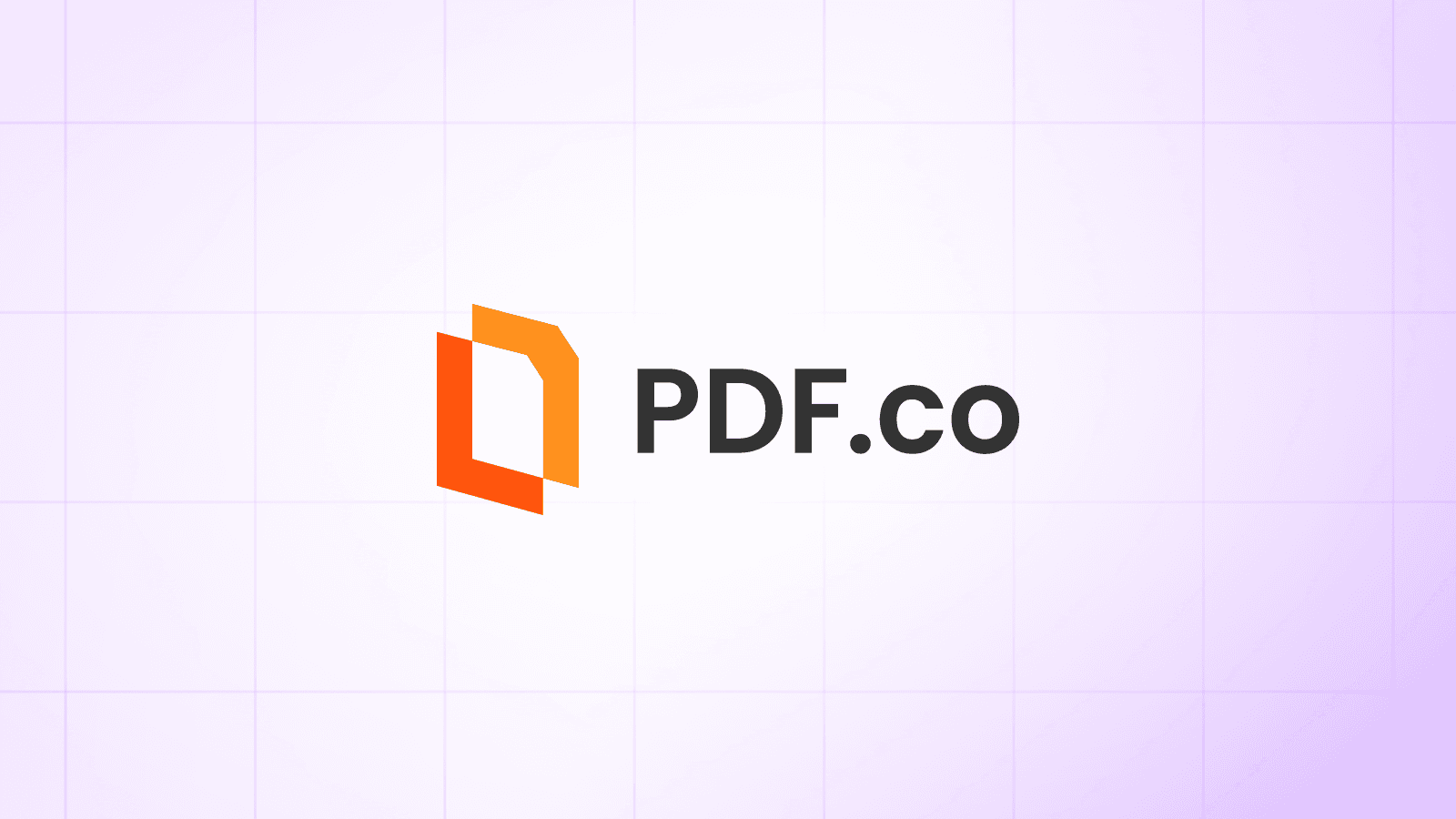Tip: Make sure your PDF.co template matches your PO structure so that fields like Purchase Order Number, Vendor Name, etc., are extracted correctly.
Automated Purchase Order Processing and Notification Workflow
What You'll Have When Done
A fully automated workflow built in n8n that:
- Watches a folder in Google Drive for new purchase order PDFs.
- Parses key details using PDF.co Document Parser.
- Stores structured purchase order data in Airtable for record keeping.
- Automatically notifies the vendor by email with order details once the record is created.
This workflow helps teams eliminate manual data entry, maintain accurate purchase order logs, and instantly notify vendors — saving hours of work weekly.
Prerequisites
Before you begin, make sure you have:
- A PDF.co API Key → Get it here
- Google Drive OAuth2 credentials configured in n8n
- An n8n instance (cloud or self-hosted)
- A Google Drive folder dedicated to new POs
- An Airtable base and table to store extracted PO data
- A valid SMTP configuration (e.g., Gmail SMTP)
- A custom PDF.co Document Parser Template that matches your PO format
Sample Test File : Link Here
Quick Start Options
Option A: Instant Setup
- Import the workflow JSON file.
- Connect your Google Drive and Airtable credentials.
- Add your PDF.co API key in the HTTP Request node.
- Add your SMTP credentials for email notifications.
- Set the correct Google Drive folder ID and Airtable table.
- Upload a sample purchase order to test.
Option B: Build It Step-by-Step
Follow the detailed 4-step guide below to create the automation from scratch.
What This Automation Does (Overview)
- Step 1: Detects when a new purchase order PDF is uploaded to Google Drive.
- Step 2: Sends the file to PDF.co and extracts key fields.
- Step 3: Inserts the extracted data into Airtable.
- Step 4: Sends an automated notification email to the vendor with the PO details.
Example: When you drop a new PO PDF into your Google Drive folder, the system parses PO Number, Vendor Name, Total Amount, Vendor's Email and Delivery Date — then stores and emails it automatically.
Step 1: Monitor for New Purchase Orders
Node: Google Drive Trigger
What happens: This node continuously watches your specified Google Drive folder. As soon as a new purchase order file is uploaded, the workflow kicks off — ensuring no manual start is needed.
Configuration Details:
- Trigger On:
Changes involving a specific folder - Folder to Watch: Select or paste your folder ID
- Watch For:
File Created
Success Looks Like:The trigger activates immediately when a PO file is uploaded, passing its metadata and download link to the next node.
Step 2: Parse PO Data with PDF.co Document Parser
Node: HTTP Request → PDF.co
What happens: This step extracts key data points from the uploaded PO file using a predefined Document Parser template. No manual data entry required.
Configuration Details:
- Method:
POST - URL:
https://api.pdf.co/v1/pdf/documentparser - Headers:
x-api-key: Your PDF.co API keyContent-Type:application/json
- Body:
url:{{ $json.webContentLink }}templateId: your template IDinline:true
Success Looks Like: PDF.co responds with a structured JSON payload containing parsed data fields.
Note: Learn more about PDF.co Document Parser API
Step 3: Store Extracted Data in Airtable
Node: Airtable
What happens: The parsed data is automatically saved in your Airtable base, making it easy to view, track, or sync with other systems.
Configuration Details:
- Operation:
Create - Base: Select your Airtable base (e.g., “Purchase Order Record”)
- Table: Select your table (e.g., “Invoice”)
- Mapped Fields:
Purchase Order Number→={{ $json.body.objects[1].value }}Vendor's Name→={{ $json.body.objects[2].value }}Total Amount→={{ $json.body.objects[3].value }}Delivery Date→={{ $json.body.objects[4].value }}Vendor's Email→={{ $json.body.objects[5].value }}
Success Looks Like: A new row is added to your Airtable table every time a PO is processed.
Step 4: Send Vendor Notification Email
Node: HTTP Request → PDF.co Email API (SMTP)
What happens: Once the record is saved, the workflow automatically emails the vendor, confirming receipt and processing of their PO.
Configuration Details:
- URL:
https://api.pdf.co/v1/email/send - Method:
POST - Headers:
- x-
api-key: Your PDF.co API key Content-Type:application/json
- x-
- Body:
from: your_email@gmail.comto: {{ $('HTTP Request').item.json.body.objects[5].value }}subject: Update on Your Purchase Order {{ $('HTTP Request').item.json.body.objects[1].value }}bodyHtml:
<p>Hi {{ $('HTTP Request').item.json.body.objects[2].value }},</p>
<p>We wanted to let you know that your <strong>Purchase Order {{ $('HTTP Request').item.json.body.objects[1].value }}</strong> has been successfully updated in our system.</p>
<ul>
<li><strong>PO Number:</strong> {{ $('HTTP Request').item.json.body.objects[1].value }}</li>
<li><strong>Total Amount:</strong> {{ $('HTTP Request').item.json.body.objects[3].value }}</li>
<li><strong>Delivery Date:</strong> {{ $('HTTP Request').item.json.body.objects[4].value }}</li>
<li><strong>Status:</strong> Archived</li>
</ul>
<p>If any of these details appear incorrect, contact us at
<a href="mailto:{{ $('HTTP Request').item.json.body.objects[5].value }}">{{ $('HTTP Request').item.json.body.objects[5].value }}</a>.
</p>
<p>Thank you for your continued partnership!</p>
<p>Best regards,<br>Procurement Team</p>smtpserver:smtp.gmail.comsmtpport:587smtpusername:your SMTP usernamesmtppassword:your SMTP app passwordasync:true
Success Looks Like: The vendor receives an email notification containing their PO details in real-time.
Final Workflow Overview
- Google Drive Trigger → Detect PO file upload
- PDF.co Document Parser → Extract structured PO data
- Airtable → Store parsed PO details
- PDF.co Email API → Notify vendor of successful processing
This creates a fully automated PO processing pipeline with zero manual intervention.
Pro Tips & Best Practices
- Use consistent PO templates to improve parsing accuracy.
- Configure email authentication with SMTP securely.
- Add logging or a Slack alert for failed parses.
- Consider adding a “Validation” step before sending emails.
- Store vendor communication history inside Airtable or CRM.
Why This Is Powerful
- Time savings: No more manual data entry.
- Accurate records: Everything is logged in Airtable automatically.
- Instant communication: Vendors are notified in real time.
- Secure & Scalable: Uses trusted APIs (Google Drive, Airtable, PDF.co).
- Flexible: Can be extended to approval flows, archiving, or Slack alerts.
Built something cool with this workflow? Share it with us @pdfdotco
Related Tutorials



